Just like everything else, there are two ways of earning backlinks. One is the more time-consuming and long cut way and the other one is the shortcut way.
When it comes to building links for a website, many marketers and website owners fall into the trap of using short tactics to earn links in the hope of earning multiple backlinks as quickly as possible.
However, the only point they miss to learn here is that link building shortcut tactics do more harm than good in the long run.
One such tactic is link farming.
In this post, you are going to learn what a link farm is, why you must avoid it, how to identify a link farm, and how to fix it.
Let’s go.
What is link farming
Despite the risks and harm it does to a website’s backlinks profile, link farming is still one of the most used backlinks-earning shortcut tactics in the SEO world.
Let’s understand what it is.
Link farming is what its name suggests. Just like how a real farm includes multiple plants to grow foods, a link farm includes multiple websites that are solely created to give backlinks to other websites.
Unlike other websites that are created to provide value and serve a greater purpose to the audience, link farms are sham websites that are solely created to provide backlinks to other websites.
Example of a link farm:
For example, let’s say website A doesn’t have any backlinks pointing to it. So website A uses the short tactic and gets links from multiple websites that are solely created for the purpose of providing links to other websites.
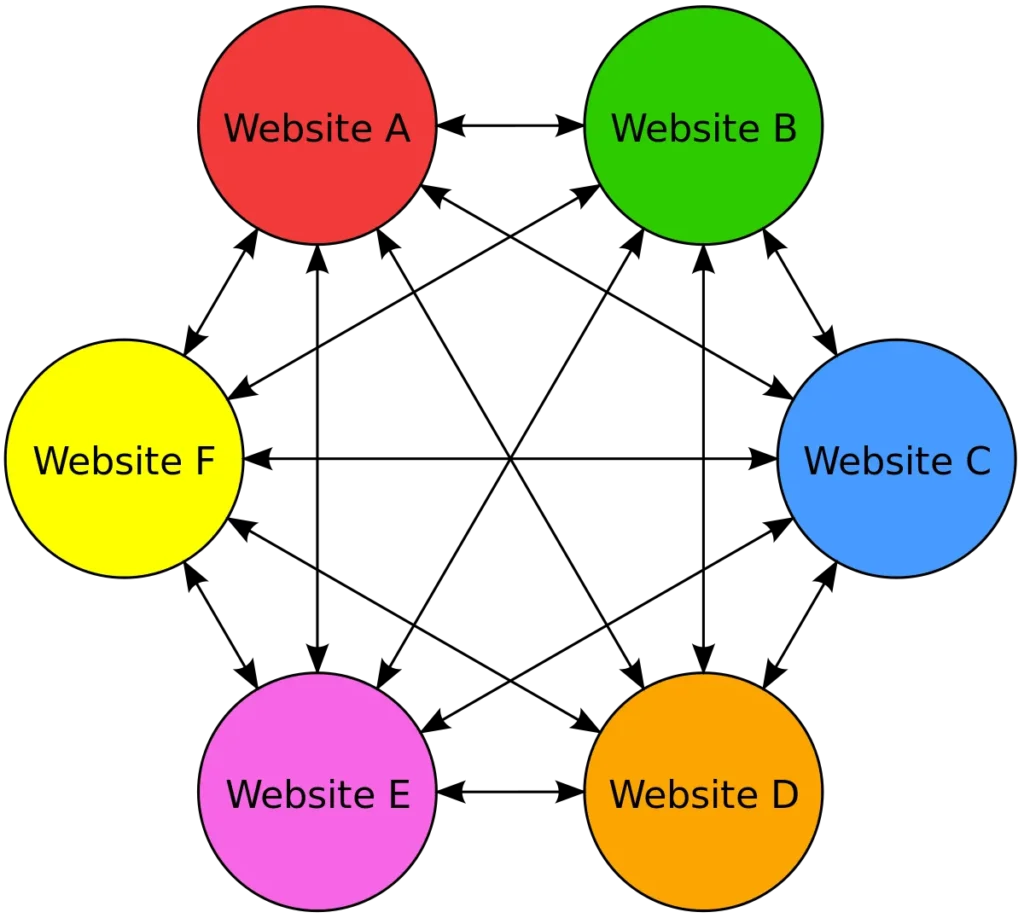
Why you should avoid link farming or Is link farming worth the risk
If link farming is one of the best ways of earning backlinks quickly, why should you avoid using it? Shouldn’t you just use this technique and gain many links and simply skyrocket your rankings? Won’t that be a good plan?
Although many black-hat SEO experts would say that link farming is the best way to earn links to your website, it’s not worth the risk.
Well, here’s why you should avoid link farming.

1. It gives you long-term damage
SEO is not just about today. It’s about today, tomorrow, the next month, and the next year. Link farming may give you short-term benefits today, but its consequences will harm you in the long term.
2. There is a risk of penalties
Farm links are just some fake links that Google hates. When you use farm links there are high chances of gaining spammy links that Google can easily detect.
Today we announced the March 2024 core update & new spam policies that, in combination, are designed to show less content made to attract clicks and more content that people find useful. Learn more: https://t.co/wQVZ8mExRB
— Google Search Central (@googlesearchc) March 5, 2024
Google is an advanced search engine with advanced algorithms that are extremely good at identifying unnatural links. It can easily determine which links are earned through merit and which links are earned through artificial tactics.
If Google finds such fake links on your website, it can penalize your website for it.
Some results of getting penalized by Google can be:
- Daily reduction in your website’s traffic
- Daily reduction in your website’s search engine rankings
As a result, you’ll have to do a full site audit and remove all kinds of spammy farm links in order to get back to the race.
To avoid penalties consider hiring credible SaaS link building agencies.
3. Harm your website’s reputation
Nowadays, any normal internet user can access and check any website’s backlinks profile whenever they want. People have also become aware and therefore they try to ensure that the website they visit is a quality website.

In such cases, if a user finds low-quality links to your website, it can drastically affect your website’s reputation and credibility.
Moreover, if other legitimate websites find out that your website is using link farms to gain backlinks, they may never link to your website regardless of the quality of your content.
That’s why if you want to maintain your website’s reputation, you must never use link farms.
4. You cannot trust links from link farms
The next thing to note is that you can never trust the links that you get from link farms.
Firstly, it’s because of the quality of those links. You see, the only job of link farms is to provide links to other websites, therefore you never know how good the link coming to your website is going to be. This often leads to many low-quality links in your backlinks profile.
Plus, Google is extremely good at identifying low-quality and spammy links and the websites they are coming from.

Next, even if a link farm owner is doing good, you never know when Google is going to penalize that website. Link farms can get penalized and removed at any time by Google and all the links that you paid for can get wasted with zero results.
5. Competitive disadvantage
When it comes to running a business successfully, one of the most important things to do is outplaying your competitors. You can never take a chance of getting beaten by your competitor as it can result in a loss of audience, sales, profit, and overall business.
If you are using link farming techniques to earn links and your competitors are using other ethical tactics to earn links, there is a high chance that your competitors will outperform you.
This is because Google hates links from link farms and if it identifies your website using link farms, it will penalize your website and decrease your rankings.
This can give your competitors a chance to outperform your website.
6. Low-quality traffic
Links are not the only factor. When it comes to getting backlinks from link farms, it can also put your website’s traffic at risk.
You see, even if a link farm promises to send some traffic to your website, there is no guarantee on the quality of that traffic coming to your website.
You can determine a traffic’s quality by analyzing their behaviors, patterns, and bounce rates.
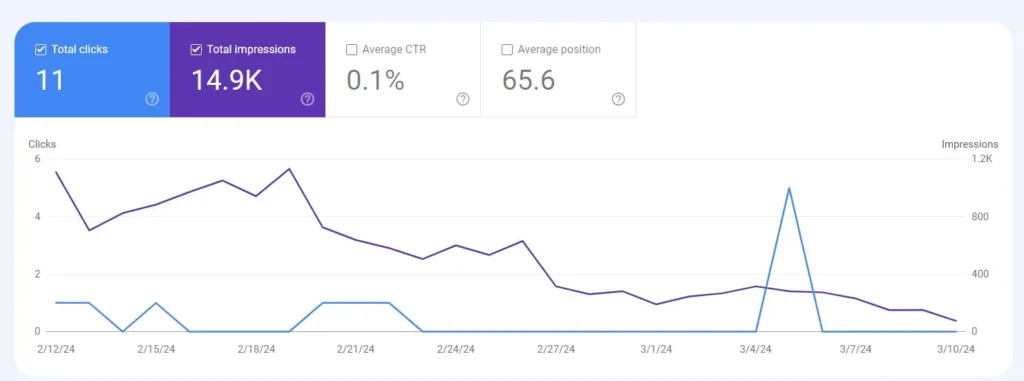
A high-quality traffic might bring people who are actually interested in your business and might consider using your product or service. Moreover, they will also have a lower bounce rate and a high retention rate.
Whereas, low-quality traffic will bring people who have a high bounce rate because they are not interested in your product or services.
7. It’s a waste of resources
Instead of investing your time, money, and other resources in link farming, you must try to invest them in earning backlinks organically. This is because the former doesn’t provide any guarantee of growth while the latter surely provides good results.
8. It’s difficult to recover
Before going for it, you must know that it’s extremely difficult to recover from the penalties that you get from Google. That is because it often requires a systematic and time-consuming approach to get back to the race.
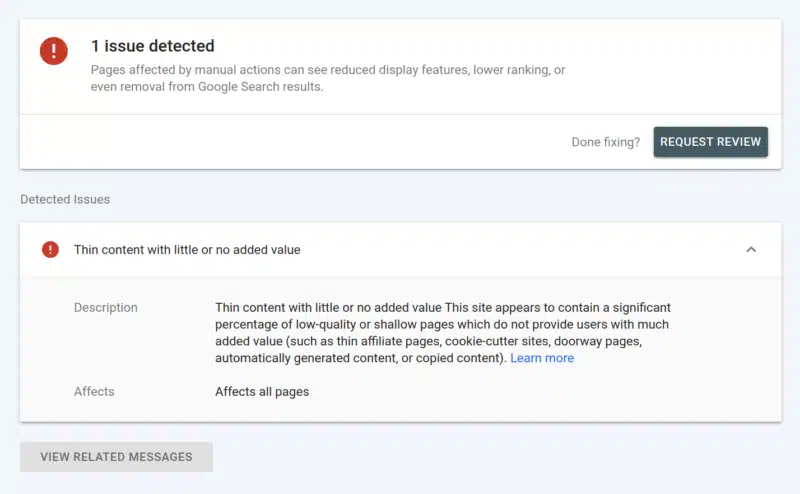
9. You lose opportunities
When you use black-hat techniques like link farming to earn backlinks to your website, you lose the trust of your peer websites. Moreover, a damaged reputation can also lead your customers to choose your competitors over you.
Why Google hates link farm
Now that you know what a link farm is, let us understand why Google hates link farms. After all, they are just links from some other websites, right? Let’s understand.
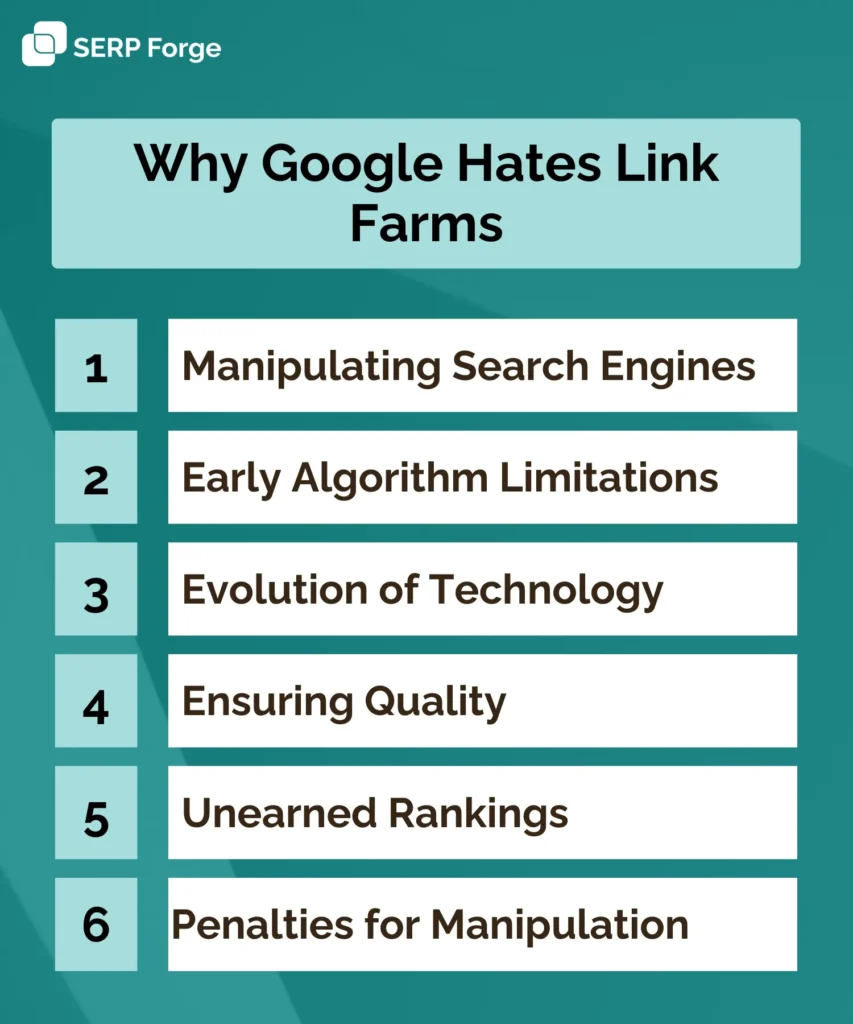
Link farming is considered an artificial way of manipulating search engines and comes with heavy penalties for using such kind of black hat tactics to earn backlinks to a website that didn’t actually earn them.
In the early days, when Google’s algorithm “Pagerank” was new, it couldn’t identify the difference between a real link and an artificial link created by link farms.

The only way it determines a website’s authority is through the number of links pointing to it. The more backlinks a website had, the higher the website would rank. And on the other hand, it couldn’t tell the difference between fake links and the real ones.
This led many people to use link-farming techniques in order to gain backlinks to their websites and skyrocket their rankings.
However, this tradition came to its downfall when Google began to come up with new and more advanced technologies and algorithm systems which could also tell the difference between a real link and an artificial link.
You see, Google is the most used search engine in the entire world, and therefore it needs to ensure that every single website ranking on its search engine is a quality website and deserves to gain that position.
And that’s why it uses backlinks as a ‘vote’ from websites to determine the quality of a website.

A website using farm links skips the hard-working phase and earns links from sham websites that it does not deserve.
Google hates link farms because these links are not any kind of vote from any real website and therefore the website getting these links doesn’t really deserve to rank higher on search engines.
It is a way of trying to manipulate the search engine by earning fake links. Google does its best to identify such fake links from link farms and penalize the websites with such links.
History of link farms
But how were link farms even introduced? How did this tradition begin? Let’s understand.
Let’s go back to 1999 when Inktomi was the most popular search engine among users. At that time, there were no advanced algorithms and therefore this search engine used a strategy that determined a website’s ranking with the number of backlinks it had.

During this time, the websites that had the most number of links were the websites that dominated the search rankings.
This is when link farms were first introduced.
Since other popular search engines like Yahoo! were also pulling some results from Inktomi, the websites with a higher number of links would not only be able to rank higher on Inktomi but also get the opportunity to rank on other search engines.
All of this led more people to engage in such link farm techniques to get more links to their websites.
Google’s Pagerank: A game changer
Things were going well for SEO experts who were using link farms until Google introduced its new algorithm Pagerank.
Instead of solely looking for the number of backlinks a website has, Pagerank came up with a new technique where it used various strategies to also determine the quality of a backlink.
So now instead of solely relying on the number of links, the search engine analyzed both the quantity as well as the quality of backlinks to determine a website’s rankings.
Later, Google came up with many new algorithms such as Google Panda, Google Penguin, and Google Spam Brain that made link farms more ineffective.
Yes, some black-hat SEO experts still use link farms to earn links, but these algorithms have made it extremely difficult for them to make their links look natural and escape penalties.
Why do link farms have high DA
One very important thing to keep in mind when checking a website is to not solely rely on its domain authority.
Often farm link websites have a high domain authority which tricks users into believing that they are high-quality websites.
Here are some reasons why these websites may have a high DA:
- A large number of websites linking to each other can contribute to a high DA score.
- The website is simply built on an expired domain with an existing high DA.
- The website uses manipulative techniques to deceive users.
- The website used to be an authoritative site in the past.
How to identify a link farms
Before trying to get a link from any website, you must ensure that it is a quality website and not a farm link. Here’s how you can identify link farms.
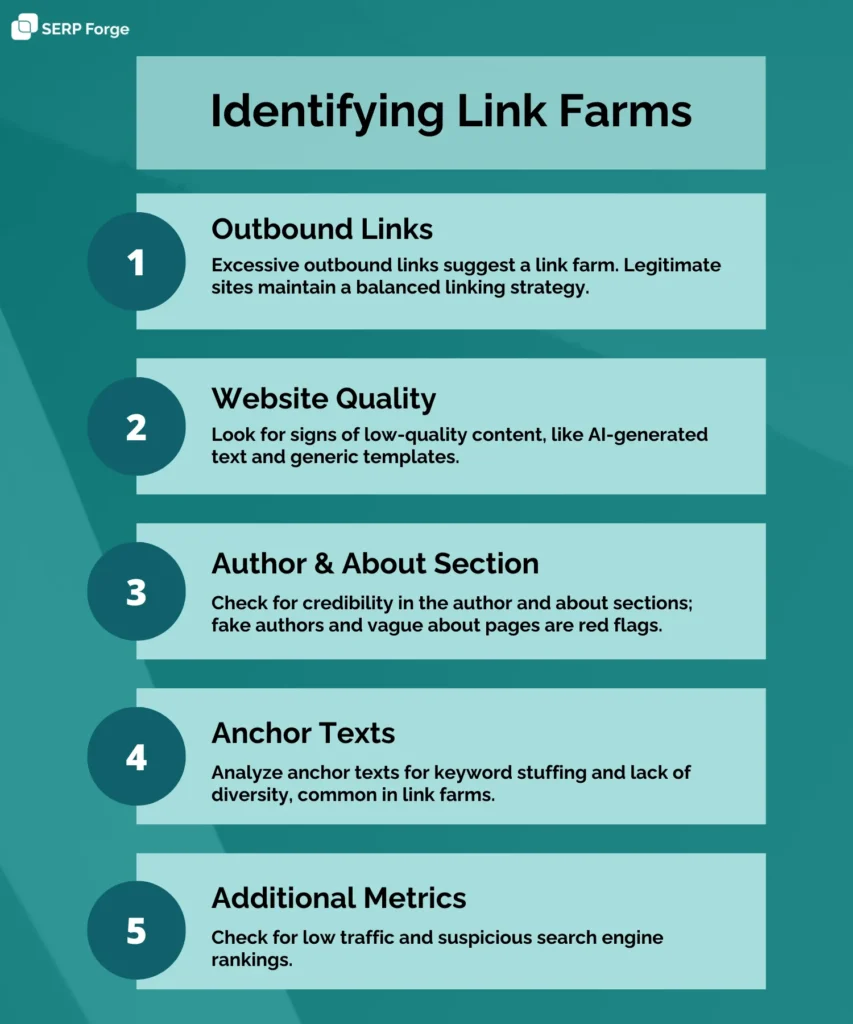
1. Check the number of outbound links
One of the best ways to identify a link farm is by checking the number of links a website is linking to.
You see, linking to an external website is usually a good thing when it comes to improving your website’s SEO. But if a website is linking to a large number of websites, you can understand that something’s not right there.
This can also be determined by checking individual pages. If some individual pages on a website are linking to a large number of other web pages, there is a high chance that it’s a link farm.
Any website that is linking to many external websites (more than required) can be a link farm.
2. Check the website’s overall quality
Another great way of identifying a link farm is by simply looking at the site and checking its quality.
Websites in a link farm usually don’t focus on uploading any kind of quality content and the content on that website is usually AI-generated.

You can also check the templates and styles the website is using. Link farm websites never focus on creating their own template or customizing the existing ones.
One more way to determine the quality is by taking a look at their domains. Link farms usually use cheap Top-Level domains (.xyz, .top).
3. Check the author and about section
One more way to identify a link farm website is by looking at its author and about section.
You can go to the author section of that website and check if it looks fake or legitimate. If the author is shown as an anonymous person or a stock image is used in the author section, there is a high chance that it is a fake one.

Next, go to the About section and read the content. If you feel that the content on the About page is also computer-generated and doesn’t tell much about the website and its people, you might be dealing with a link farm.
Lastly, these kinds of websites don’t usually have a “contact us” section. Even if they have one, it’ll be some basic contact form.
4. Check the anchor texts
Next, you can also identify a link farm website by simply looking at the anchor texts of its outbound link.

Take a look at all the links from its content and analyze their anchor texts. If the site uses more keyword-rich anchor texts and likes many websites with the same anchor texts, there is a high chance that it’s a farm link website.
A legitimate website always has a natural anchor text ratio with some naked URLs, some keyword anchor texts, and some brand anchor texts, all linking to different websites with different anchor texts.
But if a website is using manipulative anchor texts, it’s probably a part of the link farm.
5. Check other metrics
Finally, you can also use some other metrics to identify a link farm. For example, you can check the traffic coming to a website to determine its quality and strength. An old website with almost no traffic is probably a link farm website.
Next, you can also check the website’s ranking on search engines. Take a look at the kind of keywords that a website is ranking for and the number of keywords it is ranking for, to determine the quality of a website.
All of this will give you an idea of which website is a legitimate website and which one is a part of a link farm.
How to fix links from link farms
If you’ve intentionally or unintentionally engaged yourself in farm links and have generated links from such websites, it’s time to fix those links. Your website can be penalized at any time for using such manipulative practices. Here’s how you can fix it.
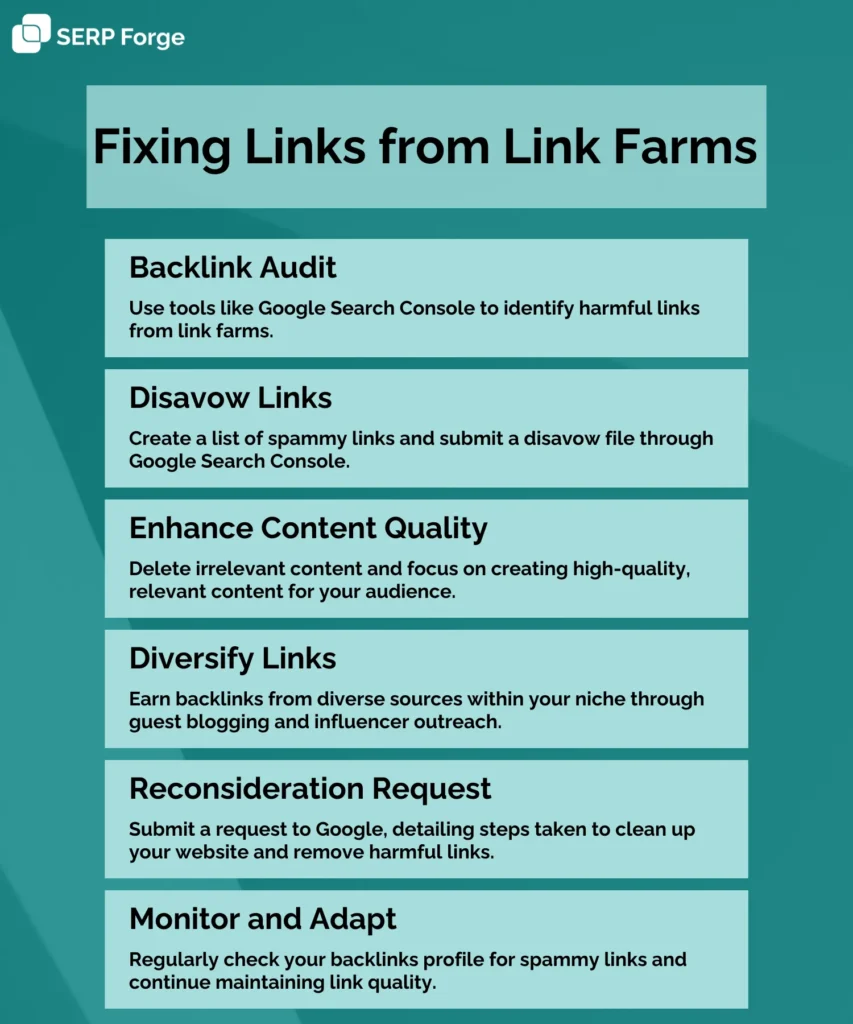
1. Audit your backlinks
Your first step is to analyze and audit your entire backlinks profile. This means that you need to check all the backlinks coming to your site and also all the links your website is pointing to, to identify low-quality and harmful links from link farms.

You can use tools like Google Search Console or Ahrefs backlinks checker to check your backlinks.
2. Disavow harmful links
Next, once you find all the harmful links coming to your website from link farms, it’s time to disavow those links.
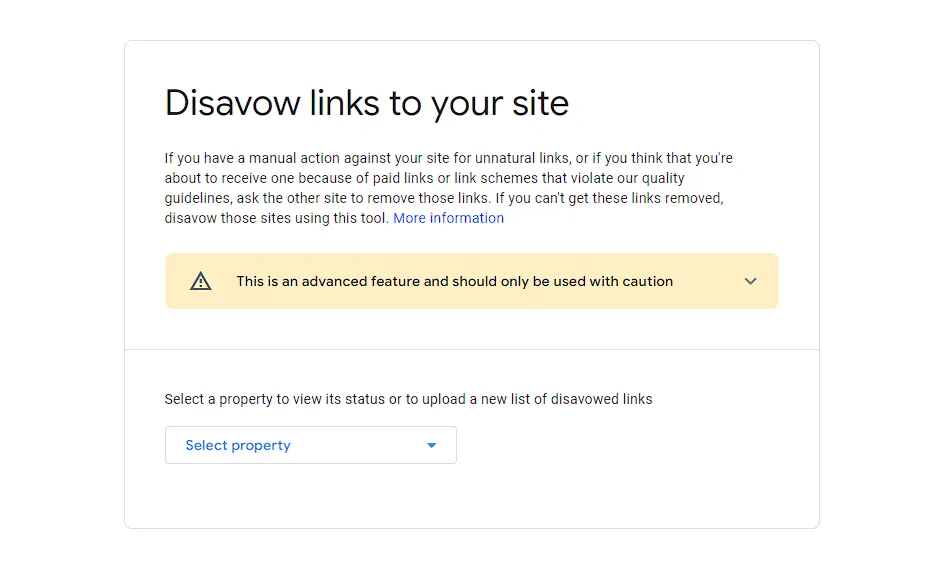
Make a list of all the harmful and spammy links pointing to your website that you need to disavow. Then submit the disavow file through Google Search Console to inform search engines to ignore those links.
3. Improve your content quality
By this time, there is a high chance that Google has already identified some spammy links on your website. If it did, your website has already entered the bad notes of the search engine. Now it’s time to get your position back.
All this starts with your content. Analyze the content that you already have on your website. Delete all the irrelevant and low-quality pieces of content to ensure a high quality is maintained.
Start writing content that is relevant to your niche and also helpful for your audience.
4. Diversify your links profile
Now, it’s time to make your links profile more organic and natural by diversifying all the links coming to your website.
Use strategies to earn backlinks from different websites within your niche to build a diverse links profile. Use strategies like guest blogging, influencer outreach, and so on, to earn multiple backlinks from different websites.
5. Reconsideration request
Once you’ve removed all the harmful links and used all the necessary steps, you can apply for a reconsideration request in your Google webmaster tool.
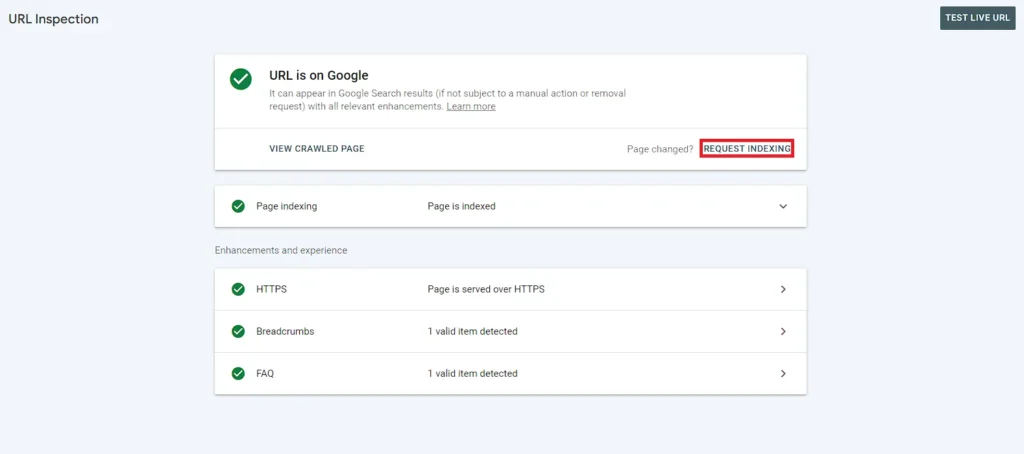
You’ll need to clearly specify all the steps that you have taken to clean your website and turn it into a high-quality website with strong links. Also, provide evidence of disavowed links or link removal efforts.
6. Monitor and adapt
Finally, the last step is to regularly monitor and adapt your backlinks profile.
Take a look at your backlinks profile regularly and identify and check if there are any harmful or spammy links coming from low-quality websites. Make sure to remove such links and continue maintaining the quality of your backlinks profile.
Other things you can do instead of link farming
It’s true that we have a lot of competition in the SEO world when it comes to taking the top spots in the SERP. That’s why in some cases it becomes extremely difficult to avoid shortcuts and continue focusing on the organic slow process.
But you need to trust us when we say this – if you really want to improve your SEO, you must avoid shortcuts and black-hat techniques at any cost.
Here are some things you can do instead of link farming.
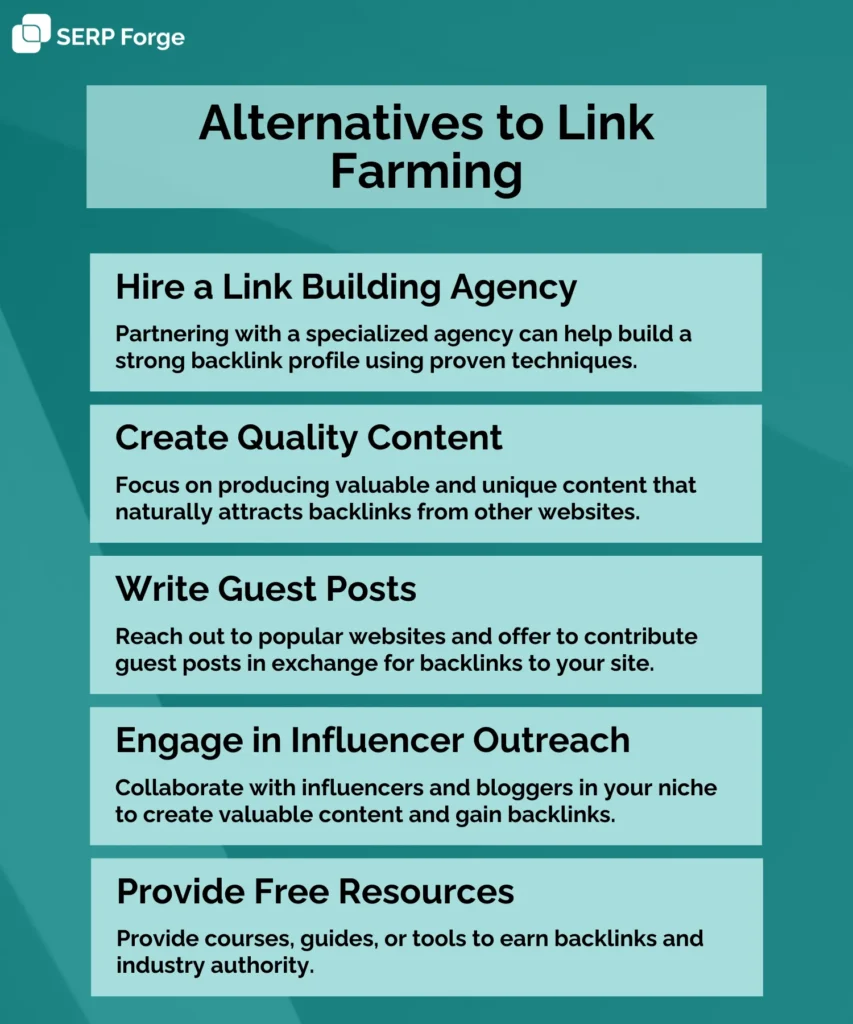
Hire link building agency
Hands down this is one of the best things to do if you want to build your profile with strong backlinks.
Link building agencies are specialized service providers that are best at using techniques to earn backlinks to their clients’ websites. These agencies know what works and what doesn’t when it comes to link building and therefore working with them is undoubtedly going to be the best decision you can make for your website.
We at SERP Forge are dedicated to understanding your needs and building the links that your website deserves. Contact us and start getting strong links to your website today!
Write quality content
Now this one is an obvious point. The best way to earn links to your website is by writing content that encourages other websites to link to your content. Make sure to provide the value and uniqueness it should have.
Write guest posts
Another thing that you can do instead of focusing on link farming is to write guest posts. You can reach out to popular websites and ask them if they would like to accept a free guest post from you in exchange for a backlink.
Influencer outreach
Next, you can also start collaborating with popular influencers in your niche to increase your visibility and gain backlinks. Reach out to popular influencers and bloggers and collaborate with them to create a valuable piece of content.
Provide free resources
Another great way of earning backlinks to your website is by providing a valuable piece of resource for free. This resource can be anything like a free course, an ultimate guide, a free template, or a free tool.
To learn more about all the other things that you can do instead of link farming to earn backlinks,
Link Building Tips & Strategies
Interested in improving ranking of your SaaS? Click here to discover more.
Conclusion
So here we are to the end of this post.
You’ve now learned everything about link farms that you need to know. Now it’s your responsibility to decide whether or not to use link farms for your website (tip: don’t use it).
If you don’t know how to build links to your website and are looking for some way to gain backlinks, you can always contact our team.
SERP Forge will help you get the right kind of link that you deserve, and skyrocket your SEO rankings.
FAQs
Why are link farms considered unethical?
Link farms are considered an unethical practice because they try to manipulate search engines by earning fake votes (backlinks). Instead of earning links organically, link farms try to earn links that they don’t deserve by engaging in link exchange activities. This also affects the online ecosystem.
Can link farming improve my website’s SEO quickly?
Yes, in the short term, it can. But once Google identifies those links from link farms, all the rankings and improvement that you gained will again start going back to zero, taking your website back to where it started. Getting penalized by search engines can damage your website’s future performance as well.
Can I recover from search engine penalties related to link farming?
Yes, you can recover from search engine penalties related to link farming. For this, you’ll have to first disavow all the harmful links and remove all links generated from link farms. Once this is done, you’ll again start seeing small improvements in your website’s SEO.




